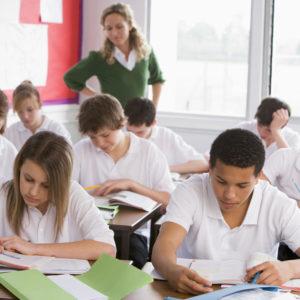Editor’s Note: For another viewpoint, see Point: Families, Not Bureaucrats, Are the Real Education Experts
The greatest threat to the well-being of children isn’t a virus: It’s their parents, according to some academics.
Harvard University law professor Elizabeth Bartholet has ignited a firestorm of controversy by arguing for a presumptive government ban on homeschooling in a recent law journal article. Her claims are largely relics of a bygone era dominated by “progressive” education theorists who believed that government bureaucrats know better about educating children than parents.
Bartholet explains in the current issue of Harvard Magazine that because homeschooling is not regulated enough by government, children could be at the mercy of parents who are “essentially” illiterate, or worse, neglectful or abusive.
Absent government intervention, parents control their children’s education and upbringing — something Bartholet deems “authoritarian” and “dangerous.”
Her solution is compulsory government schooling to ensure “that children grow up exposed to community values, social values, democratic values, ideas about nondiscrimination and tolerance of other people’s viewpoints.”
Adding fuel to the fire, Bartholet has convened a “private and by invitation-only” Harvard summit in June to focus on “problems of educational deprivation and child maltreatment that too often occur under the guise of homeschooling.”
No doubt participants will be channeling the likes of Horace Mann, considered the Father of American Public Education, and John Dewey, who wanted a Prussian-style system of uniform, compulsory schooling for the United States.
According to these and other leading 19th- and 20th-century education theorists, such a system would improve our “democratic” institutions through the distinctly un-democratic means of forcing parents — especially poor and immigrant parents — to send their children to government-run schools that would instill the proper “social and political consciousness.”
Proponents believed this democratic end justified such un-democratic means because ultimately, as the Wisconsin Teachers Association put it in 1865, “children are property of the state.”
Of course, that view is wholly at odds with the Constitution, which neither mentions the word “education,” nor gives the federal government any enumerated power over it. That’s a real problem for “progressives,” including Dewey, who dismissed the notion of individual rights as “idolatry to the Constitution,” as well as Bartholet, who says the Constitution is “outdated and inadequate.”
The data, however, show that homeschooling parents are getting results that make government schools seem inadequate.
The scholarly research shows more than a 100-fold increase in the numbers of homeschooled students since the early 1970s, from 13,000 to more than 2.4 million. The latest EdChoice Schooling in America Survey also finds that the proportion of parents whose top educational option would be homeschooling reached an all-time high of 15 percent in 2019, a threefold increase since 2012.
These trends correspond with the federal government’s dramatically increased involvement in K-12 education, staring with the Elementary and Secondary Education Act in 1965 and the establishment of the Department of Education in 1979.
If parents, many of whom probably attended public schools themselves, were satisfied with “public” education, homeschooling would have died off — not exploded.
Given such growth, it stretches credulity to suggest, as Bartholet does, that homeschooling parents are some kind of nefarious lunatic fringe. It also ignores scholarly evidence.
For example, research for the Department of Education finds that homeschooling parents come from all walks of life and are socioeconomically diverse.
It also shows that by a margin of more than two to one, parents say their most important reason for homeschooling their children is concern about school environments, such as safety, drugs or negative peer pressure, not religious instruction.
The majority of peer-reviewed studies also shows that compared to their conventionally educated peers, homeschooled students have higher K-12 academic achievement, more positive social development, better college performance, and more positive longer-term life outcomes, including greater life satisfaction, political toleration and civic engagement.
Ultimately, most homeschooling parents are successfully educating their children.
Rather than learn from their success, “progressive” academics like Bartholet apparently want to eliminate the competition — an impulse that hardly seems democratic or tolerant.

